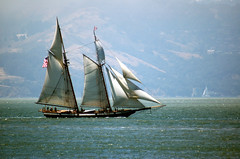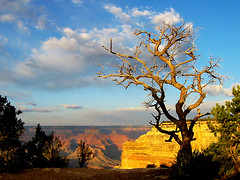I feel this way nowadays - working on some stuff, and effectively offline/off-blogging as a result.
Feels good too - there is, and always has been, more to life than audit trails that need to be well, audited.
A post-modern post-colonial posting on the web. Expect eclectic, intelligent, fun thoughts and notable trails across the web and life.
Monday, August 29, 2005
Thursday, August 25, 2005
Use your illusion

Found via boingboing - focus on the cross in the center and the purple dots disappear - neat!
Saturday, August 20, 2005
Clipper in the Bay
We're going to California - love the Bay!
Technorati Tags: bay, flickr, sfo, san+francisco, california
Technorati Tags: bay, flickr, sfo, san+francisco, california
Thursday, August 18, 2005
Pleistocene Park USA
During the Pleistocene era - between 1.8 million to about 10,000 years ago - North America was home to a myriad of mega fauna.
Once, American cheetah (Acinonyx trumani) prowled the plains hunting pronghorn (Antilocapra americana) - an antelope-like animal found throughout the deserts of the American Southwest - and Camelops, an extinct camelid, browsed on arid land.
Some Cornell University researchers would like to recreate the magic by re-introducing modern relatives of these creatures such as tigers, lions and elephants to the American plains.
This is presented as an alternative conservation strategy for the twenty-first century, but could very well introduce new variables into the American ecosystem leading to unintended consequences, for example, other species falling ill from new bacteria. Mutations among the introduced species are also likely. Given the feral animal population encroaching on urban areas, or perhaps it's the other way around, this may be a complex proposition. Hunters may be elated, though.
Bring it on - Pleistocene Park USA awaits!
Full text of Nature Magazine report on the re-wilding of America (subscription/purchase only, unfortunately)
Technorati Tags: conservation, animals, nature, wild, wild+animals, usa, america, tiger, lion, elephant
read more | digg story
Once, American cheetah (Acinonyx trumani) prowled the plains hunting pronghorn (Antilocapra americana) - an antelope-like animal found throughout the deserts of the American Southwest - and Camelops, an extinct camelid, browsed on arid land.
Some Cornell University researchers would like to recreate the magic by re-introducing modern relatives of these creatures such as tigers, lions and elephants to the American plains.
Obviously, gaining public acceptance is going to be a huge issue, especially when you talk about reintroducing predators," said lead author Josh Donlan, of Cornell University. "There are going to have to be some major attitude shifts. That includes realising predation is a natural role, and that people are going to have to take precautions."
This is presented as an alternative conservation strategy for the twenty-first century, but could very well introduce new variables into the American ecosystem leading to unintended consequences, for example, other species falling ill from new bacteria. Mutations among the introduced species are also likely. Given the feral animal population encroaching on urban areas, or perhaps it's the other way around, this may be a complex proposition. Hunters may be elated, though.
Bring it on - Pleistocene Park USA awaits!
Full text of Nature Magazine report on the re-wilding of America (subscription/purchase only, unfortunately)
Technorati Tags: conservation, animals, nature, wild, wild+animals, usa, america, tiger, lion, elephant
read more | digg story
Yahoo groups down
Looks like Yahoo Groups is having an outage - can't get to any of my groups.
Not sure if other parts of yahoo are out.
Earlier this year, some Yahoo groups were banned in India for allegedly carrying anti-India messages
Earlier today, a computer worm disrupted the networks of U.S media organizations today such as CNN, ABC, and the New York Times. This exploited the recently announced Windows PnP vulnerablity.
Not sure if this is related
Not sure if other parts of yahoo are out.
Earlier this year, some Yahoo groups were banned in India for allegedly carrying anti-India messages
Earlier today, a computer worm disrupted the networks of U.S media organizations today such as CNN, ABC, and the New York Times. This exploited the recently announced Windows PnP vulnerablity.
Not sure if this is related
Wednesday, August 17, 2005
Hundreds Of Bomb Blasts In Bangladesh
Bangladesh was rocked with over 400 bomb blasts across the country. At least 115 people have been injured and at least two people killed. The Islamic militant group, Jamayetul Mujahedin, banned earlier this year by the government, has claimed responsibility.
The blasts took place across 58 of the country's 64 districts. Leaflets with verbiage like "Implement Islamic Rule in Bangladesh" and "Bush And Blair be warned and get out [Of Muslim countries]" were also recovered. The leaflets were written in Bengali and Arabic. Police said the bombs contained explosives packed in small containers and wrapped in tape, paper or sawdust-- instead of the nails or shrapnel that more deadly bombs contain. They were rigged with small battery-powered timers, and designed to cause more noise and panic than harm. A small boy was killed near Dhaka when he picked up a device. The blasts took place mainly at government offices, press clubs and courts across the country

The Bangladesh government has long insisted there was no threat from Islamic militancy in the country. The Bangladesh Government rejected a Canadian Security Intelligence Service (CSIS) report that had alleged that Prime Minister Begum Khaleda Zia's Government was "not doing enough" to prevent the country from becoming a "haven for Islamic terrorists" in South Asia. This belies that notion. (Awami League article on Growing Fanaticism and Extremism in Bangladesh). The current government is an alliance of parties, including a few Islamic fundamentalist groups, such as the Islami Oikyo Jote (IOJ).
A couple of key groups in Bangladesh:
The Jagrata Muslim Janata Bangladesh (JMJB) and Jama'atul Mujahideen Bangladesh (JMB), believed to be inter-related, both banned in February 2005, and currently claiming responsibility for these attacks. The operational chief is Siddiqur Rahman also known as Bangla Bhai (Bangla brother). The spiritual leader is Moulana Abdur Rahman. According to the group, it has 10,000 well-trained full-time cadres known as Ehsar, one hundred thousand part-time cadres known as Gayeri Ehsar and a large number of sympathisers. (More info on the JMB/JMJB and the apparent crackdown in Feb 2005, also the JMB/JMJB campaign against NGOs and humanitarian organizations in Bangladesh)
The Harkat-ul-Jehad-al-Islami (HuJI)(not yet banned) was established in 1992 reportedly with assistance from Osama bin Laden. The group is reportedly headed by Shawkat Osman alias Sheikh Farid. Imtiaz Quddus is the general secretary of the outfit. At one point in time the Harkat issued a slogan, Amra Sobai Hobo Taliban. Bangla Hobe Afghanistan (We will all become Taliban and we will turn Bangladesh into Afghanistan). The HuJI has an estimated membership of about 15,000. Several of these recruits were trained in the Kormi and Kasia areas of Bangladesh. Further, many hundred recruits were reportedly trained at various training camps in Afghanistan. The group is linked with the Taliban, the outlawed ULFA in Assam, India, and reportedly supported by Pakistan's ISI, as well as the Jaish-e-Mohammed. The HuJI is also linked to another Islamist extremist outfit, the Asif Reza Commando Force (ARCF) that had claimed responsibility for the January 22, 2002-attack on the American Centre in Kolkata, the capital of West Bengal. (SAIR - South Asian Intelligence Review)
Intelligence analysts are seeing a resurgence in violent acts across the world, such as the assassination of the Sri Lankan foreign minister by the LTTE. This may partly be because of a failure by governments to effectively implement the UN Resolution 1373, passed after 9/11 relating to action against terrorism.
Also, purely for historical interest, the declaration of Jihad by the IIF in 1998, notably signed by "Fazlur Rahman, amir of the Jihad Movement in Bangladesh" as well as the usual suspects.
Info from someone in Bangladesh at the time
Technorati Tags: Bangladesh, Asia, bomb+blasts, terrorism, news, bombs, attacks
The blasts took place across 58 of the country's 64 districts. Leaflets with verbiage like "Implement Islamic Rule in Bangladesh" and "Bush And Blair be warned and get out [Of Muslim countries]" were also recovered. The leaflets were written in Bengali and Arabic. Police said the bombs contained explosives packed in small containers and wrapped in tape, paper or sawdust-- instead of the nails or shrapnel that more deadly bombs contain. They were rigged with small battery-powered timers, and designed to cause more noise and panic than harm. A small boy was killed near Dhaka when he picked up a device. The blasts took place mainly at government offices, press clubs and courts across the country

The Bangladesh government has long insisted there was no threat from Islamic militancy in the country. The Bangladesh Government rejected a Canadian Security Intelligence Service (CSIS) report that had alleged that Prime Minister Begum Khaleda Zia's Government was "not doing enough" to prevent the country from becoming a "haven for Islamic terrorists" in South Asia. This belies that notion. (Awami League article on Growing Fanaticism and Extremism in Bangladesh). The current government is an alliance of parties, including a few Islamic fundamentalist groups, such as the Islami Oikyo Jote (IOJ).
A couple of key groups in Bangladesh:
The Jagrata Muslim Janata Bangladesh (JMJB) and Jama'atul Mujahideen Bangladesh (JMB), believed to be inter-related, both banned in February 2005, and currently claiming responsibility for these attacks. The operational chief is Siddiqur Rahman also known as Bangla Bhai (Bangla brother). The spiritual leader is Moulana Abdur Rahman. According to the group, it has 10,000 well-trained full-time cadres known as Ehsar, one hundred thousand part-time cadres known as Gayeri Ehsar and a large number of sympathisers. (More info on the JMB/JMJB and the apparent crackdown in Feb 2005, also the JMB/JMJB campaign against NGOs and humanitarian organizations in Bangladesh)
The Harkat-ul-Jehad-al-Islami (HuJI)(not yet banned) was established in 1992 reportedly with assistance from Osama bin Laden. The group is reportedly headed by Shawkat Osman alias Sheikh Farid. Imtiaz Quddus is the general secretary of the outfit. At one point in time the Harkat issued a slogan, Amra Sobai Hobo Taliban. Bangla Hobe Afghanistan (We will all become Taliban and we will turn Bangladesh into Afghanistan). The HuJI has an estimated membership of about 15,000. Several of these recruits were trained in the Kormi and Kasia areas of Bangladesh. Further, many hundred recruits were reportedly trained at various training camps in Afghanistan. The group is linked with the Taliban, the outlawed ULFA in Assam, India, and reportedly supported by Pakistan's ISI, as well as the Jaish-e-Mohammed. The HuJI is also linked to another Islamist extremist outfit, the Asif Reza Commando Force (ARCF) that had claimed responsibility for the January 22, 2002-attack on the American Centre in Kolkata, the capital of West Bengal. (SAIR - South Asian Intelligence Review)
Intelligence analysts are seeing a resurgence in violent acts across the world, such as the assassination of the Sri Lankan foreign minister by the LTTE. This may partly be because of a failure by governments to effectively implement the UN Resolution 1373, passed after 9/11 relating to action against terrorism.
Also, purely for historical interest, the declaration of Jihad by the IIF in 1998, notably signed by "Fazlur Rahman, amir of the Jihad Movement in Bangladesh" as well as the usual suspects.
Info from someone in Bangladesh at the time
Technorati Tags: Bangladesh, Asia, bomb+blasts, terrorism, news, bombs, attacks
Le Reef
I took this picture at the wonderful Shedd Aquarium in Chicago
Technorati Tags: reef, flickr, shedd, aquarium, fishes, underwater, photos, photography
Technorati Tags: reef, flickr, shedd, aquarium, fishes, underwater, photos, photography
Monday, August 15, 2005
Have a good Monday!
One of my favorite short stories of all time is "Travels With My Cats" by Mike Reznick - it won the Hugo for best short story this year - please read and appreciate - the story and the picture.
Technorati Tags: cat, cats, sci-fi, scifi, sciencefiction, science+fiction, worldcon, interaction, flickr, photos
Technorati Tags: cat, cats, sci-fi, scifi, sciencefiction, science+fiction, worldcon, interaction, flickr, photos
England Draws Third Ashes Test Against Australia
England went to a draw with Australia in the Third Ashes test of the 62nd Ashes Series at the Old Trafford,Manchester. The teams are now 1-1 in the five games series. In a cricketing milestone, the Australian bowler Shane Warne reached 600 wickets, the first person to do so. By staying on the crease, Glenn Mcgrath and Brett Lee secured the razor-finish draw.
Australia were held up in the second innings by Ricky Ponting, who made a century when the team needed another 200 runs and had 5 wickets remaining. Queues formed all night outside the stadium for the final day of the match, and at least 10000 people were turned away, a jittery crowd to be sure. The bars will be filled tonight - some Mondays are less blue than others. Down under, editorialists, bloggers and armchair pundits will be honing their knives and rumors of rifts between Ponting and Warne will be floated - this despite their strong 76-run partnership in the second innings, at the close of the game.
In the first innings, England were all out for 444 on the morning of the second day. Australia struggled to pass their follow-on target, and rain consumed much of the third day, to finish their innings at 302. England came back with 280 runs and declared at the end of the 4th day with 280 for 6, leaving Australia with a target of 423 runs, a difficult one to meet. The fifth day had a dogged pursuit of wickets, with England taking out half the batting order by tea, three from Andrew Flintoff on his home ground. The game was up to Ricky Ponting, the Australian captain, who had scored 91 runs in the first inning. The Test was down to the wire, and that is what one expects from the Ashes.
Ricky set up a 81-run partnership with Michael Clarke. England brought one one bowler after another, but failed to penetrate the steadfast defense. Michael's wicket fell while he was at 39, being replaced by Gillespie. Soon after, Gillespie's wicket dropped with a leg-before-wicket. Australia were now 265 for 7, with 3 wickets remaining and 158 runs needed.
Ricky Ponting and Shane Warne were at the crease. The pair played well together, but the run rate dropped after a few overs, and the two battled gamely on for an ever-more distant prize. Shane pulled up his socks and delivered a few boundaries. After a break for drinks, when there were 15 overs and 113 runs remaining, Ricky Ponting replied with a couple of boundaries of his own. The momentum was kept up for a few overs, and pulse rates surely quickened with the rising run rate. Ricky Ponting crossed the magical 150-run mark just before Shane Warne was caught in a stunning sequence of events. Warne nicked the ball, bowled by Andrew Flintoff. The ball flew to Strauss at second slip; he missed and the ball fell towards his knee; Geraint Jones dived to his right and caught the ricochet! That was a 76-run, 21-over partnership between two fine players.
Australia now needed 83 runs off the last nine overs of the day - a run rate of more than 9 runs an over (an over has 6 balls, for you ignorant heathens:) ) The runs came in dribbles, with a couple of maiden overs (no runs). Suddenly, Ricky Ponting was caught behind by the wicket-keeper while he was at 156 runs and there were just four overs to go. The crowd went ecstatic and roared. A statistician might be able to name a match where the tail end picked up the pace and won the match, but it was far from certain here. Glenn Mcgrath, despite a torn ligament, paired off with Lee for the final overs. They played it safe, although they got a boundary off each of the overs. This was sensible, for it meant the match ended in a draw, with both players not out.
The Australians were exultant, and the result can be safely attributed to Ricky Ponting's steering of the ship into it's safe berth with the draw, although that might not be quite as exciting as an actual victory.
Final scores:

Shane Warne, one of Wisden's Five Cricketers of the 20th Century, became the first bowler to take 600 wickets when he had Marcus Trescothick caught behind on the first day of the third Test at Old Trafford. At the beginning of his career, he bowled Mike Gatting out at the same stadium 12 years ago with his first ball in Test Cricket. As Wisden put it then,
The Ashes are probably the most fiercely contested trophy in the history of cricket. The series is named after the trophy, which is a small terracotta urn said to contain the burnt bails from a game played in 1882 at The Oval. The series has seen many fine and tumultuous moments, such as the Bodyline series of 1933, which saw full-on-body bowling attacks from the English team to contain the cricketing prowess of Don Bradman.
The urn carries the poem,
The urn also features in "Life, the Universe and Everything" by Douglas Adams. Robots steal the urn because it contains the ashes of the Wooden Pillar of Nature and Spirituality, one of the components necessary to unlock the device imprisoning the inhabitants of the planet Krikkit whose ambition is to unleash death and destruction on the galaxy. The robots are armed with flat bats and red exploding balls.
Australia has won the Ashes 30 times and England 27. Australia has held the Ashes trophy since 1989, so this series has much riding on it. Bookmakers may rework the odds after today's game, but Australia is still the odds-on favorite.
The season has not been kind to the Australians, having lost to Bangladesh, the lowest-ranked team in international cricket, and numerous defeats to England in earlier league matches, and one-day games. The earlier games were of the new Twenty20 format, with two innings of twenty overs each, each game lasting about three hours.(Comparison between cricket and baseball - funny list of 10 ways watching cricket has changed)
Cricket, for much of the world, is a religion of sorts. Despite diplomatic outrages such as those induced by Bodyline, and match-fixing scandals, the game has the potential to be a peace-maker between conflicted nations, such as the recent entente cordiale between India and Pakistan, when India toured Pakistan.
The fourth match begins on the 25th at Trent Bridge. Much rides on this match, not least the pride of the Aussies.
Technorati Tags: cricket, Ashes, England, Australia, sport, sports, news
Australia were held up in the second innings by Ricky Ponting, who made a century when the team needed another 200 runs and had 5 wickets remaining. Queues formed all night outside the stadium for the final day of the match, and at least 10000 people were turned away, a jittery crowd to be sure. The bars will be filled tonight - some Mondays are less blue than others. Down under, editorialists, bloggers and armchair pundits will be honing their knives and rumors of rifts between Ponting and Warne will be floated - this despite their strong 76-run partnership in the second innings, at the close of the game.
In the first innings, England were all out for 444 on the morning of the second day. Australia struggled to pass their follow-on target, and rain consumed much of the third day, to finish their innings at 302. England came back with 280 runs and declared at the end of the 4th day with 280 for 6, leaving Australia with a target of 423 runs, a difficult one to meet. The fifth day had a dogged pursuit of wickets, with England taking out half the batting order by tea, three from Andrew Flintoff on his home ground. The game was up to Ricky Ponting, the Australian captain, who had scored 91 runs in the first inning. The Test was down to the wire, and that is what one expects from the Ashes.
Ricky set up a 81-run partnership with Michael Clarke. England brought one one bowler after another, but failed to penetrate the steadfast defense. Michael's wicket fell while he was at 39, being replaced by Gillespie. Soon after, Gillespie's wicket dropped with a leg-before-wicket. Australia were now 265 for 7, with 3 wickets remaining and 158 runs needed.
Ricky Ponting and Shane Warne were at the crease. The pair played well together, but the run rate dropped after a few overs, and the two battled gamely on for an ever-more distant prize. Shane pulled up his socks and delivered a few boundaries. After a break for drinks, when there were 15 overs and 113 runs remaining, Ricky Ponting replied with a couple of boundaries of his own. The momentum was kept up for a few overs, and pulse rates surely quickened with the rising run rate. Ricky Ponting crossed the magical 150-run mark just before Shane Warne was caught in a stunning sequence of events. Warne nicked the ball, bowled by Andrew Flintoff. The ball flew to Strauss at second slip; he missed and the ball fell towards his knee; Geraint Jones dived to his right and caught the ricochet! That was a 76-run, 21-over partnership between two fine players.
Australia now needed 83 runs off the last nine overs of the day - a run rate of more than 9 runs an over (an over has 6 balls, for you ignorant heathens:) ) The runs came in dribbles, with a couple of maiden overs (no runs). Suddenly, Ricky Ponting was caught behind by the wicket-keeper while he was at 156 runs and there were just four overs to go. The crowd went ecstatic and roared. A statistician might be able to name a match where the tail end picked up the pace and won the match, but it was far from certain here. Glenn Mcgrath, despite a torn ligament, paired off with Lee for the final overs. They played it safe, although they got a boundary off each of the overs. This was sensible, for it meant the match ended in a draw, with both players not out.
The Australians were exultant, and the result can be safely attributed to Ricky Ponting's steering of the ship into it's safe berth with the draw, although that might not be quite as exciting as an actual victory.
Final scores:
England 444 & 280/6d
Australia 302 & 371/9

Shane Warne, one of Wisden's Five Cricketers of the 20th Century, became the first bowler to take 600 wickets when he had Marcus Trescothick caught behind on the first day of the third Test at Old Trafford. At the beginning of his career, he bowled Mike Gatting out at the same stadium 12 years ago with his first ball in Test Cricket. As Wisden put it then,
The only caveat on making him one of the cricketers of the 20th century is that he may yet figure in deliberations for the 21st.
The Ashes are probably the most fiercely contested trophy in the history of cricket. The series is named after the trophy, which is a small terracotta urn said to contain the burnt bails from a game played in 1882 at The Oval. The series has seen many fine and tumultuous moments, such as the Bodyline series of 1933, which saw full-on-body bowling attacks from the English team to contain the cricketing prowess of Don Bradman.
The urn carries the poem,
When Ivo goes back with the urn, the urn;
Studds, Steel, Read and Tylecote return, return;
The welkin will ring loud,
The great crowd will feel proud,
Seeing Barlow and Bates with the urn, the urn;
And the rest coming home with the urn.
The urn also features in "Life, the Universe and Everything" by Douglas Adams. Robots steal the urn because it contains the ashes of the Wooden Pillar of Nature and Spirituality, one of the components necessary to unlock the device imprisoning the inhabitants of the planet Krikkit whose ambition is to unleash death and destruction on the galaxy. The robots are armed with flat bats and red exploding balls.
Australia has won the Ashes 30 times and England 27. Australia has held the Ashes trophy since 1989, so this series has much riding on it. Bookmakers may rework the odds after today's game, but Australia is still the odds-on favorite.
The season has not been kind to the Australians, having lost to Bangladesh, the lowest-ranked team in international cricket, and numerous defeats to England in earlier league matches, and one-day games. The earlier games were of the new Twenty20 format, with two innings of twenty overs each, each game lasting about three hours.(Comparison between cricket and baseball - funny list of 10 ways watching cricket has changed)
Cricket, for much of the world, is a religion of sorts. Despite diplomatic outrages such as those induced by Bodyline, and match-fixing scandals, the game has the potential to be a peace-maker between conflicted nations, such as the recent entente cordiale between India and Pakistan, when India toured Pakistan.
The fourth match begins on the 25th at Trent Bridge. Much rides on this match, not least the pride of the Aussies.
Technorati Tags: cricket, Ashes, England, Australia, sport, sports, news
Sunday, August 14, 2005
Carnival Of The Capitalists is up
The latest round of the Carnival of the Capitalists is up at Weekend Pundit
Some notable posts: Andre Agassi's implementation of his No Child Left Behind policy, the best post on a plumbing diagram of the US Treasury, my own post on Oil Dependence, a discussion of why Oracle's move into Core Banking is a strategic decision, the Big Picture of Real Estate softening, the possible future of wikipedia, an interesting one on railroad firemen after the Age of Steam, and an excellent analogy between outsourcing and garages. I should also mention fellow blogcritic John Bambenek's post on loans to illegal aliens
Great reading - as always.
Technorati Tags: carnival, capitalism, economics, business, carnival+capitalists, blog, blogs
Some notable posts: Andre Agassi's implementation of his No Child Left Behind policy, the best post on a plumbing diagram of the US Treasury, my own post on Oil Dependence, a discussion of why Oracle's move into Core Banking is a strategic decision, the Big Picture of Real Estate softening, the possible future of wikipedia, an interesting one on railroad firemen after the Age of Steam, and an excellent analogy between outsourcing and garages. I should also mention fellow blogcritic John Bambenek's post on loans to illegal aliens
Great reading - as always.
Technorati Tags: carnival, capitalism, economics, business, carnival+capitalists, blog, blogs
Mounting ISO files as Virtual Drives
A common challenge faced by most tech-savvy folks is handling ISO files. ISO is a format for binary images of CD-ROMs, normally the ISO 9660 file system. The traditional way to access their contents is to burn the ISO image to a CD.
A blogger was able to digg out a utility provided by Microsoft to mount ISO images to a virtual hard drive directory. This utility is absolutely unsupported by myself, Microsoft, or aliens on Vogon. Basically, an ISO-file becomes a drive letter in your 'My Computer'.
It requires you to copy a virtual device driver to your [windowssystem32drivers directory, and then mount the ISO image as a virtual drive using the Virtual CD Control Panel.
In case the file moves from the Microsoft site, I am providing a link to the "Virtual CD-ROM Control Panel for Windows XP" utility - again, under no warranties, implicit or assumed.
Another tool that does more, and IS supported, is Daemon Tools
Technorati Tags: iso, microsoft, cd, cd-rom, technology, how-to, utility, tweak, virtual+drive
read more | digg story
A blogger was able to digg out a utility provided by Microsoft to mount ISO images to a virtual hard drive directory. This utility is absolutely unsupported by myself, Microsoft, or aliens on Vogon. Basically, an ISO-file becomes a drive letter in your 'My Computer'.
It requires you to copy a virtual device driver to your [windowssystem32drivers directory, and then mount the ISO image as a virtual drive using the Virtual CD Control Panel.
In case the file moves from the Microsoft site, I am providing a link to the "Virtual CD-ROM Control Panel for Windows XP" utility - again, under no warranties, implicit or assumed.
Another tool that does more, and IS supported, is Daemon Tools
Technorati Tags: iso, microsoft, cd, cd-rom, technology, how-to, utility, tweak, virtual+drive
read more | digg story
Friday, August 12, 2005
An Analysis of Top Hollywood Film Revenues in Constant Dollars
The following is a preliminary analysis and some observations on revenues and viewership of the Top Hollywood films of all time.
This demonstrates that if one discounts inflation, most of the good films are all in the past.
The sources of data are IMDB.com, the MPAA and box-office archives.
Firstly, the current report from IMDB.com provides the list of all-time top grossing films in the United States, using box-office revenues.
The curremt top-ten are:
I applied a deflator to convert the top-grossing film revenues to constant 2005 dollars. I also retrieved a summary of historical ticket prices and converted this to constant dollars as well to use the same base.
The following are some interesting charts on the revenue generated by top-grossing films from 1937, the earliest data was available from IMDB.com:
One notes that box-office revenues seem to be leveling off, despite spikes caused by the blockbusters of the last few years - mostly the fantasy trilogies.
One notes the peak in viewership for top-grossing films in 1939, and the significant drop since then, recently improved. One also notes that 2005 has not contributed much thus far, despite some huge block-busters being released.
The following demonstrates how the ranking of films changes when measured in constant dollars rather than current dollars.
For comparison, these are the Top Grossing films, by Constant 2005 dollars
The preliminary conclusion one draws is that revenues generated from the biggest films are not providing much help in keeping revenues up. Also, viewership seems to be down for these films, probably because of home video sales for them.
The Star Wars films are especially interesting. When ranked by Constant 2005 dollar revenue, the ranking is:
The Excel file used to generate these reports is provided. The Source Data sheet has the data used. The Original Web Query Data sheet has a web query which is refreshable to allow up-to-date revenue data. You are welcome to continue to work the data.
Technorati Tags: hollywood, movies, films, film, box+office, business, economics, charts, analysis, top+movies, top+films
This demonstrates that if one discounts inflation, most of the good films are all in the past.
The sources of data are IMDB.com, the MPAA and box-office archives.
Firstly, the current report from IMDB.com provides the list of all-time top grossing films in the United States, using box-office revenues.
The curremt top-ten are:
| Rank | Title | USA Box Office$ |
|---|---|---|
| 1 | Titanic | $600,779,824 |
| 2 | Star Wars | $460,935,665 |
| 3 | Shrek 2 | $436,471,036 |
| 4 | E.T. the Extra-Terrestrial | $434,949,459 |
| 5 | Star Wars: Episode I - The Phantom Menace | $431,065,444 |
| 6 | Spider-Man | $403,706,375 |
| 7 | Star Wars: Episode III - Revenge of the Sith | $377,864,535 |
| 8 | The Lord of the Rings: The Return of the King | $377,019,252 |
| 9 | Spider-Man 2 | $373,377,893 |
| 10 | The Passion of the Christ | $370,270,943 |
I applied a deflator to convert the top-grossing film revenues to constant 2005 dollars. I also retrieved a summary of historical ticket prices and converted this to constant dollars as well to use the same base.
The following are some interesting charts on the revenue generated by top-grossing films from 1937, the earliest data was available from IMDB.com:

Revenue in constant 2005 dollars per year generated by top grossing films

Trendline of revenue from top-grossing films
One notes that box-office revenues seem to be leveling off, despite spikes caused by the blockbusters of the last few years - mostly the fantasy trilogies.

Viewership for top-grossing films by year
One notes the peak in viewership for top-grossing films in 1939, and the significant drop since then, recently improved. One also notes that 2005 has not contributed much thus far, despite some huge block-busters being released.
The following demonstrates how the ranking of films changes when measured in constant dollars rather than current dollars.

Ranking by Const. dollar 2005 gross box-office revenue

Ranking by gross box-office revenue
For comparison, these are the Top Grossing films, by Constant 2005 dollars
| Rank in Const $ | Title | Const $ Revenue$ |
|---|---|---|
| 1 | Gone with the Wind | $2,759,101,083 |
| 2 | Snow White and the Seven Dwarfs | $2,498,993,041 |
| 3 | Star Wars | $1,472,637,907 |
| 4 | Bambi | $1,223,775,595 |
| 5 | The Sound of Music | $1,001,314,638 |
| 6 | One Hundred and One Dalmatians | $987,096,774.2 |
| 7 | Jaws | $935,251,798.6 |
| 8 | The Exorcist | $889,413,043.5 |
| 9 | E.T. the Extra-Terrestrial | $871,642,202.4 |
| 10 | The Jungle Book | $819,905,271.7 |
The preliminary conclusion one draws is that revenues generated from the biggest films are not providing much help in keeping revenues up. Also, viewership seems to be down for these films, probably because of home video sales for them.
The Star Wars films are especially interesting. When ranked by Constant 2005 dollar revenue, the ranking is:
The Excel file used to generate these reports is provided. The Source Data sheet has the data used. The Original Web Query Data sheet has a web query which is refreshable to allow up-to-date revenue data. You are welcome to continue to work the data.
Technorati Tags: hollywood, movies, films, film, box+office, business, economics, charts, analysis, top+movies, top+films
Thursday, August 11, 2005
British East India Company
While researching an article, I was browsing the wikipedia entry on the British East India Company. I was surprised to find the link to the dissolution of the company in 1874 under the East India Stock Dividend Redemption Act went nowhere.
I have started editing the entry - my second original entry to wikipedia - and am looking for more information on the Act, ideally the full text. The current entry:
I also came across this snippet of financial information on the performance of East India Stock, from the history of the City of London Livery Companies, or the Worshipful Company of Upholders
It appears as if dividends reduced after the Crown took over the Company.
Technorati Tags: history, britain, india, east+india+company, raj, dividends, economics
I have started editing the entry - my second original entry to wikipedia - and am looking for more information on the Act, ideally the full text. The current entry:
After the Sepoy Mutiny of 1857, things went downhill for the British East India Company.
In 1858, by the Act for the Better Government of India, the Crown assumed all governmental responsibilities held by the company, and its 24,000-man military force was incorporated into the British army. The company was dissolved on January 1, 1874, when the East India Stock Dividend Redemption Act came into effect.
Benjamin Disraeli was the Prime Minister of England at the time and Queen Victoria was the ruling monarch. Queen Victoria was the first monarch to use the title Empress of India from 1 January 1877
Retrieved from "http://en.wikipedia.org/wiki/East_India_Stock_Dividend_Redemption_Act"
I also came across this snippet of financial information on the performance of East India Stock, from the history of the City of London Livery Companies, or the Worshipful Company of Upholders
In 1868 the assets of the Company still comprised £5,850 East India Stock and £2,000 East India Debentures, and the actual net income amounted to £382 13s. 10d., a return of nearly 5 per cent. net, which compares very favourably with the present returns that are obtainable. Most of the income was being spent at that time, and the bills for the Albion Tavern, Aldersgate, amounted to no less than £225 in 1869. In 1882 the dividends from the East India Stock were reduced from 5 per cent. to 4 per cent., and in 1886 Corporation Duty made its first appearance.
During this time the income from the investments remained constant, but the expenditure was kept within limits, with the result that by 1889 there was a balance in hand of over £200. In that year the East India 4 per cent. Stock was redeemed, and the proceeds, or part thereof, amounting to £5,571 6s., were invested in £3,000 (nominal) Victoria Inscribed Stock and £2,000 South Australian Stock. In 1891 the balance of the redemption money was invested in £3I5 7s. 2¾ per cent. Consols.
It appears as if dividends reduced after the Crown took over the Company.
Technorati Tags: history, britain, india, east+india+company, raj, dividends, economics
Wednesday, August 10, 2005
Booker Prize list announced
In one of the best years for writing for a while, the judges of the Man Booker Prize have announced a weighty, yet relatively short longlist of nominees for the Booker Prize 2005. It is choc-a-bloc with must-read books, including a few that are as-yet unpublished.
A very globalized list, depicting the zeitgeist, showing the richness of writing from the Commonwealth, and disproving the much-rumored death of the novel, and representative to some extent of popular taste, at least in the reading public. Odds-on favorites for the shortlist, I believe, include the Rushdie, the Ishiguro, the McEwan, the Barnes and the Ali Smith, but judges have been capricious in the past, and could end up choosing a list that has a few young'uns. J K Rowling could not be reached for comment on her omission, the sixth in a row, though in unrelated news, she responded to some allegations and rumors through scraps thrown in her website's rubbish bin, categorizing the notes as,Starting to Smell | Excessive Additives | Recycled | Mouldy | Pure Garbage | Toxic
The prize is open to fiction writers from the Commonwealth or the Republic of Ireland. The shortlist will be announced on September 8, and the winner of the award will be announced at a ceremony at the Guildhall in London on October 10.
Technorati Tags: booker, books, prize, literature, rushdie, mcewan, 9/11, globalization, news, culture
- The Harmony Silk Factory by Tash Aw
- Set in Malaysia, it tells the tale of a bold Malaysian businessman during World War II, in the form of a triptych- The Sea by John Banville
- A tale of coming-of-age, life's end, and other rites of passage at an Irish coastal town- Arthur & George by Julian Barnes
- A creative book, alternating the tales of Sir Arthur Conan Doyle and George Edalji, and a mystery of sorts- A Long Long Way by Sebastian Barry
- A dark novel about Ireland and the Great War, vignettes of times forgotten and pains endured- Slow Man by JM Coetzee
- Out in September, this is a tale of meditation on what makes us human, on growing old and about Elizabeth Costello- In the Fold by Rachel Cusk
- A British comedy of manners and morals- Never Let Me Go by Kazuo Ishiguro
- Deep insights into science, ethics, childhood and boarding schools- All For Love by Dan Jacobson
- A comic melodrama, if one could describe a book thus, set in the waning days of the Hapsburg Empire.- A Short History of Tractors in Ukrainian by Marina Lewycka
- Comic farce among Ukranian immigrants to England- Beyond Black by Hilary Mantel
- A traveling psychic deconstructs middle-class England- Saturday by Ian McEwan
- A richly-layered post-9/11, post-Iraq war portrait of the way we are, and were.- The People’s Act of Love by James Meek
- It is strange that a book due in 2006 would be on this year's list, but critics are blown away by proof copies of this novel set in 1919 Siberia- Shalimar The Clown by Salman Rushdie
- The book I am most looking forward to, Salman takes up a tale set in the vales of Kashmir, the assassination of the American ambassador to India, clowns turned terrorists, and weaves in planes crashing into distant towers, Nazi France, and Shalimar's arrival in Los Angeles. His last book, Fury, was released on 9/11/2001, and was somewhat disappointing, seeming like mere navel-gazing [Editor:Take this to a review page]- The Accidental by Ali Smith
- Another 2006 imprint, it deals with an unexpected guest, and a child' vision of the world- On Beauty by Zadie Smith
- Similar to Howard's End, and set in a world of wars, yet permeated with beauty, such as Rembrandt's paintings. Her last novel, White Teeth, was a blend of Bangladesh and Jamaica, this time she blends black and white, WASP and non-WASP.- This Thing Of Darkness by Harry Thompson
- A historical tale about the 19th century voyages of the Beagle, and Charles Darwin's relationship with Captain Fitzroy, by England's popular television producer- This Is The Country by William Wall
- Travels through Ireland, finding oneself. and the divide between the city and the country
A very globalized list, depicting the zeitgeist, showing the richness of writing from the Commonwealth, and disproving the much-rumored death of the novel, and representative to some extent of popular taste, at least in the reading public. Odds-on favorites for the shortlist, I believe, include the Rushdie, the Ishiguro, the McEwan, the Barnes and the Ali Smith, but judges have been capricious in the past, and could end up choosing a list that has a few young'uns. J K Rowling could not be reached for comment on her omission, the sixth in a row, though in unrelated news, she responded to some allegations and rumors through scraps thrown in her website's rubbish bin, categorizing the notes as,Starting to Smell | Excessive Additives | Recycled | Mouldy | Pure Garbage | Toxic
The prize is open to fiction writers from the Commonwealth or the Republic of Ireland. The shortlist will be announced on September 8, and the winner of the award will be announced at a ceremony at the Guildhall in London on October 10.
Technorati Tags: booker, books, prize, literature, rushdie, mcewan, 9/11, globalization, news, culture
Art prankster Banksy sprays Israeli wall
Secretive "guerrilla" artist Banksy has decorated Israel's controversial West Bank barrier with satirical images of life on the other side.
Banksy uses street art and graffiti to create a mode of expression in the urban environment, or vandalize it, directed at alternative politics. He also does paid work for advertising, thereby feeding the same system he claims to rebel against. He earlier 'hit' New York museums, as well as the Tate, with his work.
Stunning images - The revolution will not be terrorised, as he says on his site.
More Banksy pictures at flickr
and video footage here of Banksy from Channel 4

Attack in Pink Bow.
Originally uploaded by silverfox09.
Technorati Tags: banksy, graffti, art, israel, westbank, west+bank, cartoon
Banksy uses street art and graffiti to create a mode of expression in the urban environment, or vandalize it, directed at alternative politics. He also does paid work for advertising, thereby feeding the same system he claims to rebel against. He earlier 'hit' New York museums, as well as the Tate, with his work.
Stunning images - The revolution will not be terrorised, as he says on his site.
More Banksy pictures at flickr
and video footage here of Banksy from Channel 4

Attack in Pink Bow.
Originally uploaded by silverfox09.
Technorati Tags: banksy, graffti, art, israel, westbank, west+bank, cartoon
Oil Dependence - another three thousand years
From a leading news source,
The price of oil per gallon is now between $2.60 and $2.75, at least in my area. At this price, a systemic shock to the economic system as a result of increased transportation costs is only too likely.
My father used to talk about the 'vicious cycle of inflationary capitalism' - rail,steel,oil and coal - these are the trusses of the economy, and have a much greater impact on everyday life than, say, the price of bandwidth.
Traditionally, higher oil prices lead to reduced economic activity. It is commonly believed that economies of the 21st century are less energy-dependent than before, which is certainly true to an extent. At current dollars, it would take the price of oil to rise to about $70 a barrel to match the 1970s price levels, yet we have seen little slowdown thus far. Interestingly, the declining nature of real wages and the rise in real estate prices makes it all the more unusual to see a prolonged period without economic distortion, and subsequent social change.
The effect can be more subtle than that, though. If industries and companies find it hard to raise prices either because of political or lowest-bidder markets, where customers are price-sensitive and prone to shop around for the lowest bidder, rather than exhibit brand or market loyalty, they will respond by cutting back on purchases, which has a significant ripple effect. Interestingly, it is often seen that prices fall during times of high demand. This is primarily due to a desire to protect existing markets and retain customers. Consumers react to raised energy prices by reduced discretionary expenditure. Apart from voting with their pocketbooks, they tend to forfeit control of their economic situation to the state, believing it more able to address the macro problems.
In a globalized world, however, the state is put into a quandary of epic proportions. On one hand, it must satisfy the interests of its citizens and manage inflation. On the other, it must interact in the comity of nations, each aspiring to meet the same goals. With regards to oil management, they are unable to do much, given the monopolistic nature of the market. OPEC is the 'oil manager' of the world, and is concerned with protecting its own interests, given social and governmental upheaval in the Middle East, and the threat of new technologies that could further reduce oil dependence. It's customers are therefore unable to respond effectively to their constituents.
The price of oil is also commonly believed to be set by the market - thereby subject to price elasticity on the demand curve. This is believed to be the cause for the decline in the price of oil to $10 in 1998, driven by reduced demand after the Asian financial crisis. Unfortunately, a market is only as good as it's managers. OPEC has proven, time and again, to be essentially incapable of evaluating supply and demand. It tends to increase oil production just before a drop in demand, as in 1986 and 1997, and threaten the reverse when demand begins to rise.
The most probable scenario is a combination of political and market reactions. Price controls would not work, and local oil production may not deliver the goods, therefore, governments will attempt to adopt a 'preferred buyer' model, where they will trade access rights to markets in exchange for greater control over oil. Markets, especially transportation and automotive industries will gyrate, tending to consolidate and issue warnings of failure, before an innovative white knight appears on the scene, in the form of viable alternative technology, or 'new resources' - just as industrialization and the 'New World' served as drivers in earlier waves of human growth. It is likely Stackelberg Warfare will ensue between incumbent 'home' firms and new entrants. This will lead to unrestricted economic warfare, as well as actual, physical wars to secure access to engines of growth. This is one of the reasons the WTO restricts export subsidies, recognizing that subsidies are an attempt to shift profits that can trigger retaliation and a lose-lose situation.
Another effect, and one quite likely in this newly globalized world, will be a realignment of economic forces to regions with greater bargaining power and demographic forces. During the last globalization boom, from 1870 to 1914, large economic gaps developed between the European industrial core and countries around Asia. It is possible to see similar shifts this time around, although it is unclear in which direction will the forces of capital flow. It must be remembered that the last boom brought with it the sinister and yet dextrous forces of colonialism, war, civil war and social upheaval.
The availibility, or the lack of it, of oil has never been the issue. As Sheik Yamani, erstwhile Saudi oil minister said once, "The Stone Age came to an end not for a lack of stones, and the oil age will end, but not for a lack of oil."
The oil age will end, in a few years or a few hundred - perhaps it might take as long as three millenia. 4920 AD sounds not too far off, really.
Technorati Tags: humor, oil,economics, onion
President Bush unveiled an aggressive initiative Monday that would make the U.S. free of petroleum dependence by the year 4920, less than three millennia from now.
...
"It would be a shame if, by the 33rd century, these bills were still tied up in committee. I urge the 712th Congress to pass this legislation with minimal partisan gridlock," Bush said.
...
The proclamation comes on the heels of Bush's plans to pay off the national debt by the early 6300s, and win the war on terror by 7450.
The price of oil per gallon is now between $2.60 and $2.75, at least in my area. At this price, a systemic shock to the economic system as a result of increased transportation costs is only too likely.
My father used to talk about the 'vicious cycle of inflationary capitalism' - rail,steel,oil and coal - these are the trusses of the economy, and have a much greater impact on everyday life than, say, the price of bandwidth.
Traditionally, higher oil prices lead to reduced economic activity. It is commonly believed that economies of the 21st century are less energy-dependent than before, which is certainly true to an extent. At current dollars, it would take the price of oil to rise to about $70 a barrel to match the 1970s price levels, yet we have seen little slowdown thus far. Interestingly, the declining nature of real wages and the rise in real estate prices makes it all the more unusual to see a prolonged period without economic distortion, and subsequent social change.
The effect can be more subtle than that, though. If industries and companies find it hard to raise prices either because of political or lowest-bidder markets, where customers are price-sensitive and prone to shop around for the lowest bidder, rather than exhibit brand or market loyalty, they will respond by cutting back on purchases, which has a significant ripple effect. Interestingly, it is often seen that prices fall during times of high demand. This is primarily due to a desire to protect existing markets and retain customers. Consumers react to raised energy prices by reduced discretionary expenditure. Apart from voting with their pocketbooks, they tend to forfeit control of their economic situation to the state, believing it more able to address the macro problems.
In a globalized world, however, the state is put into a quandary of epic proportions. On one hand, it must satisfy the interests of its citizens and manage inflation. On the other, it must interact in the comity of nations, each aspiring to meet the same goals. With regards to oil management, they are unable to do much, given the monopolistic nature of the market. OPEC is the 'oil manager' of the world, and is concerned with protecting its own interests, given social and governmental upheaval in the Middle East, and the threat of new technologies that could further reduce oil dependence. It's customers are therefore unable to respond effectively to their constituents.
The price of oil is also commonly believed to be set by the market - thereby subject to price elasticity on the demand curve. This is believed to be the cause for the decline in the price of oil to $10 in 1998, driven by reduced demand after the Asian financial crisis. Unfortunately, a market is only as good as it's managers. OPEC has proven, time and again, to be essentially incapable of evaluating supply and demand. It tends to increase oil production just before a drop in demand, as in 1986 and 1997, and threaten the reverse when demand begins to rise.
The most probable scenario is a combination of political and market reactions. Price controls would not work, and local oil production may not deliver the goods, therefore, governments will attempt to adopt a 'preferred buyer' model, where they will trade access rights to markets in exchange for greater control over oil. Markets, especially transportation and automotive industries will gyrate, tending to consolidate and issue warnings of failure, before an innovative white knight appears on the scene, in the form of viable alternative technology, or 'new resources' - just as industrialization and the 'New World' served as drivers in earlier waves of human growth. It is likely Stackelberg Warfare will ensue between incumbent 'home' firms and new entrants. This will lead to unrestricted economic warfare, as well as actual, physical wars to secure access to engines of growth. This is one of the reasons the WTO restricts export subsidies, recognizing that subsidies are an attempt to shift profits that can trigger retaliation and a lose-lose situation.
Another effect, and one quite likely in this newly globalized world, will be a realignment of economic forces to regions with greater bargaining power and demographic forces. During the last globalization boom, from 1870 to 1914, large economic gaps developed between the European industrial core and countries around Asia. It is possible to see similar shifts this time around, although it is unclear in which direction will the forces of capital flow. It must be remembered that the last boom brought with it the sinister and yet dextrous forces of colonialism, war, civil war and social upheaval.
The availibility, or the lack of it, of oil has never been the issue. As Sheik Yamani, erstwhile Saudi oil minister said once, "The Stone Age came to an end not for a lack of stones, and the oil age will end, but not for a lack of oil."
The oil age will end, in a few years or a few hundred - perhaps it might take as long as three millenia. 4920 AD sounds not too far off, really.
Technorati Tags: humor, oil,economics, onion
Tuesday, August 09, 2005
Monday, August 08, 2005
Remakes we never want to see
From Emerald City, some remakes that would be counter-subversive, and boring:
Some more:
Technorati Tags: remake, Hollywood, movies, humor, humour, parody
- a remake of Dune in which all mention of Spice is removed to avoid encouraging drug use
- a remake of Barbarella in which our heroine is demurely dressed at all times and never so much as kisses anyone
- a remake of I Robot in which all of our metal friends are totally law-abiding
- a remake of Jurassic Park in which attempts to clone dinosaurs fail because those fossils were only God having a joke to test our faith
- a movie of V for Vendetta in which the hero helps the government fight terrorists - no, wait, isn’t that being done?
Some more:
- a remake of Harry Potter where all the kids are petulant brats
- a remake of the Godfather where the Corleones have the best pizza business in the five boroughs
- a remake of Lord of the Rings called "Lord of Bling Bling", where Frodo must destroy the One Ring of the Lord of Bling-Bling
- a remake of the Titanic where the ship is saved because the iceberg melts due to the Ozone Hole
- a remake of Finding Nemo where just as Marlin reaches Sydney, he is killed by an oil spill
- a remake of Catch 22, where just as Yossarian finally figures a way out, he is re-enelisted by the new Stop-Loss policy
Technorati Tags: remake, Hollywood, movies, humor, humour, parody
U.S. Kicked Out of Cricket Tournament
The United States was tossed out of an international cricket tournament after an election dispute left the Americans unable to decide on a team and was replaced with the Cayman Islands in the ICC Intercontinental Cup.
About 10,000 players -- primarily expatriates from south Asia and the Caribbean -- compete in weekend games in the United States. In the USA alone, there are more than 700 cricket teams. This makes the United States the ninth most active cricket-playing country in the world, ahead of all except the top-tier Test-playing countries. Over 1.3 million Americans watched pay-per-view coverage of the 2003 Cricket World Cup, paying three times as much per viewer than their counterparts elsewhere in the world(source:cricinfo.com).
The USACA was hit with an election dispute involving two factions earlier this year, which resulted in this action
This is unfortunate, because just a year back, the US Cricket scene was really good - the national side had won the Six Nations tournament in Sharjah and had qualified for a place in the Champions Trophy. Florida was being considered as a venue to host World Cup matches in 2007, with the West Indies hosting the World Cup.
Unfortunately, they lost - were thrashed - in the Champions Trophy in September 2004. Then, Project USA, the ICC's plan to promote cricket in the country didn't quite go well. The International Cricket Council wrote to the USA Cricket Association president that "We have never seen a sporting organisation that combines such great potential and such poor administration as USACA," stressing that much of the blame laid "with the current office bearers of USACA including yourself". This led to the cancellation of Project USA in March 2005, and then the dropping of Florida as a venue for the World Cup.
Internally, much infighting within the USACA led to the formation of a rival board and lawsuits. In short, the US Cricket scene was blown to smithereens. They were not allowed to attend the annual meeting of the ICC at Lord's in June, as well. This year, they have lost the ICC Trophy in Ireland, and now, been dismissed from the Intercontinental Trophy. They play perhaps the oldest team ever in international cricket. As cricinfo.com reported after the ICC trophy,
In other news, Major League Cricket seems to be doing well. They held an Under-19 National Open Tournament in Chicago in August, and will hold an inaugural Inter-State Cricket Cup for North America in November 2005. This will be held in Florida, and will be called the Clive Lloyd Cup, with 16 states and Canadian provinces participating. The former West Indian batsman, Desmond Haynes, has been appointed US National Coach, and will oversee the Inter-State Cricket Cup tournament as well as the future training of the select MLC US squads. They had to cancel the Under-15 tournament this year, however, citing logistical difficulties.
Also, India defeated the West Indies in the Indian Oil Tri-Series Cup and will face off against Sri Lanka
Comments at blogcritics.org
Technorati Tags: cricket, news, USA, America, ICC, World+Cup, sports
About 10,000 players -- primarily expatriates from south Asia and the Caribbean -- compete in weekend games in the United States. In the USA alone, there are more than 700 cricket teams. This makes the United States the ninth most active cricket-playing country in the world, ahead of all except the top-tier Test-playing countries. Over 1.3 million Americans watched pay-per-view coverage of the 2003 Cricket World Cup, paying three times as much per viewer than their counterparts elsewhere in the world(source:cricinfo.com).
The USACA was hit with an election dispute involving two factions earlier this year, which resulted in this action
This is unfortunate, because just a year back, the US Cricket scene was really good - the national side had won the Six Nations tournament in Sharjah and had qualified for a place in the Champions Trophy. Florida was being considered as a venue to host World Cup matches in 2007, with the West Indies hosting the World Cup.
Unfortunately, they lost - were thrashed - in the Champions Trophy in September 2004. Then, Project USA, the ICC's plan to promote cricket in the country didn't quite go well. The International Cricket Council wrote to the USA Cricket Association president that "We have never seen a sporting organisation that combines such great potential and such poor administration as USACA," stressing that much of the blame laid "with the current office bearers of USACA including yourself". This led to the cancellation of Project USA in March 2005, and then the dropping of Florida as a venue for the World Cup.
Internally, much infighting within the USACA led to the formation of a rival board and lawsuits. In short, the US Cricket scene was blown to smithereens. They were not allowed to attend the annual meeting of the ICC at Lord's in June, as well. This year, they have lost the ICC Trophy in Ireland, and now, been dismissed from the Intercontinental Trophy. They play perhaps the oldest team ever in international cricket. As cricinfo.com reported after the ICC trophy,
For the first time since they started playing international cricket, the USA team returned from an international tournament with a perfect zero. They lost every single match it played in the ICC Trophy in Ireland, from the warm-ups to their final defeat.
In other news, Major League Cricket seems to be doing well. They held an Under-19 National Open Tournament in Chicago in August, and will hold an inaugural Inter-State Cricket Cup for North America in November 2005. This will be held in Florida, and will be called the Clive Lloyd Cup, with 16 states and Canadian provinces participating. The former West Indian batsman, Desmond Haynes, has been appointed US National Coach, and will oversee the Inter-State Cricket Cup tournament as well as the future training of the select MLC US squads. They had to cancel the Under-15 tournament this year, however, citing logistical difficulties.
In other cricket news, the world is looking forward to the world is looking forward to the third of the 5-game the final game of the Ashes between England and Australia beginning on Thursday between England and Australia beginning on Thursday. The series is tied at 1-1 after a nail-biting a yesterday. Australia lost earlier to Bangladesh, and concerns are raised about the pre-eminence of the Numero Uno team in World Cricket. 

Also, India defeated the West Indies in the Indian Oil Tri-Series Cup and will face off against Sri Lanka
Comments at blogcritics.org
Technorati Tags: cricket, news, USA, America, ICC, World+Cup, sports
Subscribe to:
Comments (Atom)
Some Fine Books
Blog Archive
-
▼
2005
(302)
-
▼
August
(65)
- Time unbound
- Use your illusion
- Clipper in the Bay
- Pleistocene Park USA
- Yahoo groups down
- Hundreds Of Bomb Blasts In Bangladesh
- Le Reef
- Have a good Monday!
- England Draws Third Ashes Test Against Australia
- Carnival Of The Capitalists is up
- Mounting ISO files as Virtual Drives
- A tree with an awe-inspiring view
- An Analysis of Top Hollywood Film Revenues in Cons...
- British East India Company
- Slow Down Please
- Media Luna
- teeth
- Booker Prize list announced
- Art prankster Banksy sprays Israeli wall
- Oil Dependence - another three thousand years
- Zoë - baby
- Stolen moment
- Remakes we never want to see
- gollum and the ring
- Quiz Time 7 Answers
- Support Mumbai Flood Relief
- U.S. Kicked Out of Cricket Tournament
- Doctor O, a notional comic of which I am the hero
- The Tyranny of Digital Distance
- stark reality
- Bond composer to re-record theme
- Hugo results
- Breakfast in Fur
- "Lucas Back In Anger"
- Brian Aldiss
- Crop circles mystery solved.
- Family Guy Movie set for September 27th Release!
- hot & spicy
- googlehack
- Technorati Tagging your blog posts
- No Halo 2 for you, young man!
- Firefox tuning and tweaks
- Central Park - fall
- Americons
- in a mountain village.....
- Diversity
- Windows Vista Lake desktop
- Hugo Novel Nominees 2005
- XBox 360 Rumors
- calvin and hobbes math atheist
- Gandalf
- Displaying del.icio.us bookmarks on blogger blogs
- Quiz Time 7
- Jesus404
- pop art
- Blogcritics.org - 10,000,000 (That's Ten Million!)...
- The Thin Man Films :The Thin Man
- Visual effect
- Salva-me!
- Flickr Interestingness
- breath on a mirror
- Hell's Kitchen Winner
- Carnival Of The Capitalists up
- Unleash The Fury - Yngwie Malmsteen
- Quiz Time 6 - answers up
-
▼
August
(65)







































